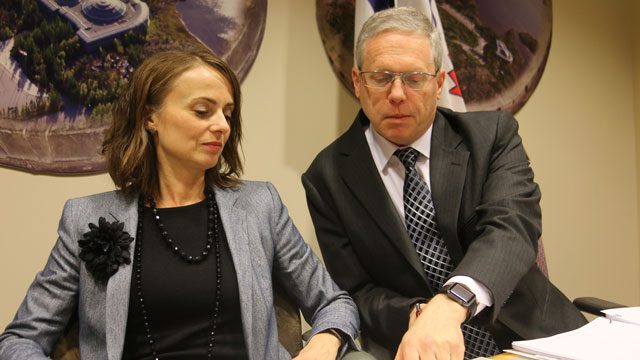
Three years ago, the government of Northwest Territories claimed to have a 72 per cent graduation rate.
But a new report on the territory’s education system shows its method of calculating high school graduation rates was fundamentally flawed.
And the actual graduation rate was 44 per cent in 2017.
“A decade after our first audit in 2010, we found there are still gaps in outcomes between students in smaller communities and those in regional centres in Yellowknife – as well as between Indigenous and non-Indigenous students,” said Glenn Wheeler of the 33-page report from the federal office of the Auditor General released Thursday.
The audit of the territory’s kindergarten to Grade 12 education system found it is falling short in every area inspected.
The findings cover the period from 2015 to 2019.
The audit said the territory did make some progress implementing full-day kindergarten and distance learning, but it did not live up to its commitments or obligations to students.
Nor was it collecting accurate data on student outcomes and correctly interpreting the data.
Similarly, training needs of operators and staff in daycares was not tracked.
“The department did not monitor inclusive schooling to know whether students were receiving the supports they needed to participate in the regular education system in their communities,” added Wheeler, who led the audit.
The 2020 report reads similar to other audits over the last decade, with the territorial government slow to implement action plans and frameworks developed five or more years ago.
The report shows access to quality education is better in Yellowknife and regional centres than in smaller communities with teachers in multi-grade classrooms, often in smaller communities being given fewer supports.
Social passing
Educators in the Northwest Territories employ something called “social passing.” It refers to the practice of pushing kids forward with their peers of the same age, rather than holding them back because of their academic performance.
But it’s no longer an option past Grade 10, and the audit found 40 per cent of students in Grade 10 repeated the grade, while another 15 per cent did not return to school.
“Maybe if the department can identify supports that children can receive before they get to Grade 10,” Wheeler said, “so even if social passing is happening they will be in a much better position to flourish when they get to the higher levels and get their high school diploma.”
Indigenous language education is also missing the mark, the audit said, despite the territorial government promising frameworks and action plans since the 2010 audit.
For example, in 2014 the department received recommendations to strengthen language-based programs but it took four years from the original audit to make good on that promise and review an Indigenous-language program. Curriculum was developed in 2018 but still hasn’t been rolled out to the schools.
“In 2011,[the department] committed to working with regional education bodies to increase the number of qualified language instructors. However, it did not assess how many languages were needed or for which languages,” Wheeler said.
Education Minister R.J. Simpson said the audit, which made nine recommendations, provides a blueprint to help the Department of Education, Culture, and Employment fix the system.
“Sometimes we were doing too many things. We had too many different initiatives,” Simpson told reporters. “So one of the things we are going to do is find out where we need to focus our energies and we are going to pare down those initiatives.”
cmorritt-jacobs.ca










